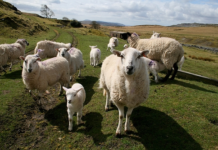
A common fungal disease that has plagued the UK’s vineyards could soon be a thing of the past, thanks to a sustainable farming process being developed by the University of Surrey and its commercial partners.
Surrey, together with Bioextractions Wales, a pharmaceutical company that specialises in compound extractions, has been awarded £407,000 to commercialise a treatment against downy mildew, which will reduce the use of copper-based products presently used to control the disease in vineyards.
Researchers have found that larch bark produces chemicals that can control this disease and can be used to treat English vineyards earmarked for export. Other collaborators of the 24-month project include Royal Botanic Gardens, Kew, Swiss partner, FiBL and Surrey’s Albury Vineyard Ltd.
Professor Dulcie Mulholland, project lead from the University of Surrey and an expert in organic chemistry, commented:
“We are pleased that UKRI is investing in this project that has the potential to improve the sustainability, productivity and resilience of UK farming on a path to net zero.
“Our project will use UK larch tree bark to produce Laryxine, an organic plant protection product for farmers across England and other wine-producing regions. Securing this funding means we can optimise the green extraction and purification methodology, and trial the product on a UK biodynamic farm.”
Mr Kevin Stephens, CEO of BioExtractions (Wales), said:
“We are delighted to lead the “Green Larixyne” project with Professor Mulholland’s Natural Products Research Group at the University of Surrey to take steps to commercialise “Larixyne”, which will provide an eco-friendly alternative to the environmentally damaging copper-based products currently in use to treat grapevine downy mildew.”
Mr Nick Wenman, owner of Albury Vineyard, said:
“Downy mildew is a disease that can cause significant damage to grapevines, not only in organic and biodynamic vineyards such as Albury but to all farmers in the UK’s rapidly growing viticulture industry.
“We are undertaking field trials using the product “Larixyne”, and preliminary results are looking promising. We are delighted, as the University of Surrey’s local vineyard, to be involved in the project.”
Help keep news FREE for our readers
Supporting your local community newspaper/online news outlet is crucial now more than ever. If you believe in independent journalism, then consider making a valuable contribution by making a one-time or monthly donation. We operate in rural areas where providing unbiased news can be challenging. Read More About Supporting The West Wales Chronicle
























